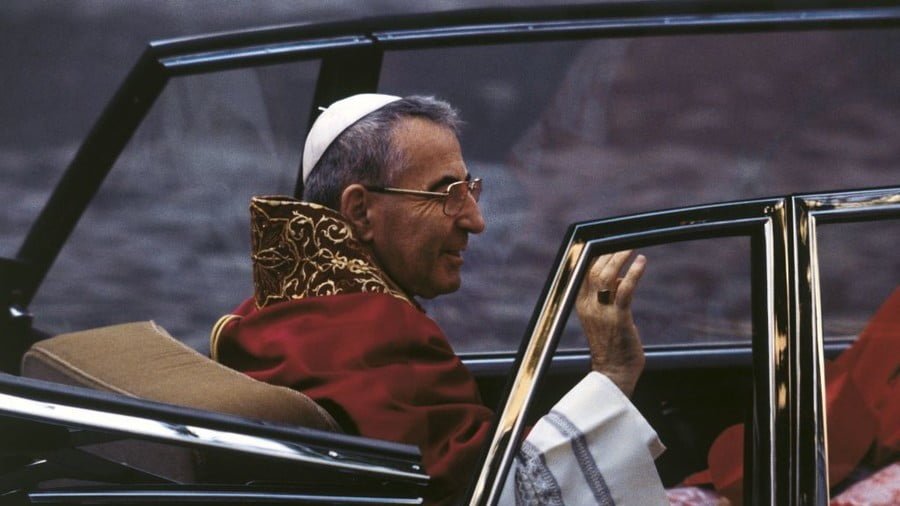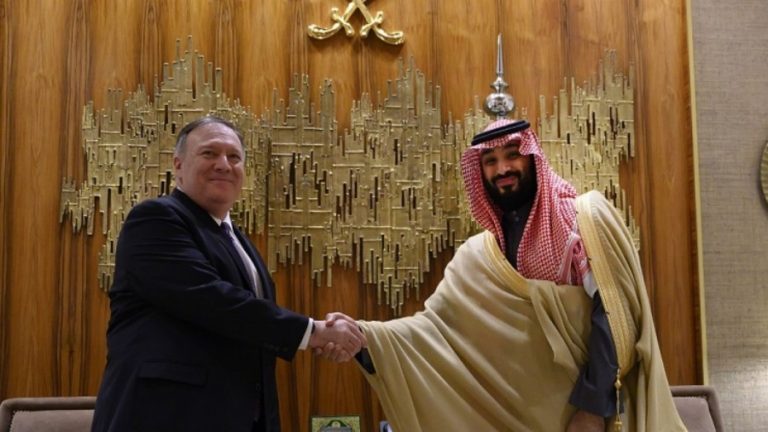A CIA Lucky Break? How the Death of the ‘Smiling Pope’ Helped Washington Win the Cold War
The sudden death of Pope John Paul I, exactly 40 years ago today, stunned the world. The ‘Smiling Pope’ had only served for 33 days. His demise and replacement by John Paul II marked an important turning point in the old Cold War.
The year 1978, as I argued in a previous op-ed, was the year today’s world was made.
There was nothing inevitable about the ascendancy of Reagan and Thatcher, the rise of groups like Al-Qaeda and IS, and the downfall of the Soviet Union. The neoliberal, neoconservative world order and its associated violence came about because of key events and decisions which took place 40 years ago. The Vatican was at the heart of these events.
The drama which unfolded there in the summer of 1978 would have been rejected as being too far-fetched if sent in as a film script. In a space of two and a half months, we had three different Popes. There was no great surprise when, on August 6, the first of them, Pope Paul VI, died after suffering a massive heart attack. The Supreme Pontiff, who had served since 1963, was 80 and had been in declining health. But the death of his much younger successor, John Paul I, a radical reformer who wanted to build a genuine People’s Church, has fuelled conspiracy theories to this day.
Cardinal Albino Luciani, the working-class son of a bricklayer (and staunch socialist), from a small town in northern Italy, was a Pope like no other. He refused a coronation and detested being carried on the sedia gestatoria – the Papal chair. He hated pomp and circumstance and pretentiousness. His speeches were down to earth and full of homely observations, with regular references to popular fiction. He possessed a gentle humor and always had a twinkle in his eye. He was by all accounts an incredibly sweet man.
But there was steel there, too. Luciani was determined to root out corruption, and to investigate the complex financial affairs of the Vatican’s own bank, and its connection to the scandal-hit Banco Ambrosiano.
While he had declared communism to be incompatible with Christianity, his father’s egalitarian ethos stayed with him. “The true treasures of the Church are the poor, the little ones to be helped not merely by occasional alms but in the way they can be promoted,” he once said. At a meeting with General Videla of Argentina, he made clear his abhorrence of fascism. “He talked particularly of his concern over ‘Los Desaparecidos’, people who had vanished off the face of Argentinian earth in their thousands. By the conclusion of the 15th minute audience the General began to wish that he had heeded the eleventh-hour attempts of Vatican officials to dissuade him coming to Rome,” noted David Yallop in his book ‘In God’s Name’.
One cleric, Father Busa, wrote of John Paul I: “His mind was as strong, as hard and as sharp as a diamond. That was where his real power was. He understood and had the ability to get to the centre of a problem. He could not be overwhelmed. When everyone was applauding the smiling Pope, I was waiting for him ‘tirare fuori le unghie’, to reveal his claws. He had tremendous power.”
But John Paul I never lived to exercise his “tremendous power.” He was found dead in his bed on the morning of September 28, 1978. The official story was that the ‘Smiling Pope’ had died from a heart attack. But it wasn’t long before questions were being asked. John Paul I was only 65 and had appeared to be in fine health. The fact that there was no post-mortem only added to the suspicions. “The public speculation that this death was not natural grew by the minute. Men and women were heard shouting at the inert form: Who has done this to you? Who has murdered you?” wrote David Yallop.
David Yallop revealed that on the day of his death, the Pope had discussed a reshuffle of Vatican staff with Secretary of State Cardinal Jean Villot, who was also to be replaced. Yallop claimed that the Pope had a list of a number of clerics who belonged to the Freemasons, membership of which was strictly prohibited by the Church. The most sinister of these Masonic lodges was the fiercely anti-communist Propaganda Due (P2), which held great influence in Italy at this time, being referred to as a “state within a state.” The murky world of P2, and its leaders’ links with organized crime, the Mafia and the CIA is discussed in ‘In God’s Name’.
Another writer, Lucien Gregoire, author of ‘Murder by the Grace of God’, points the finger of blame squarely at the CIA. He notes a seemingly strange coincidence, namely that on September 3, 1978, just 25 days before the Pope himself died, Metropolitan Nikodim, the visiting leader of the Russian Orthodox Church, who was later revealed to have been a KGB agent, fell dead at John Paul’s feet in the Vatican after sipping coffee. He was only 48. Gregoire says that the CIA dubbed John Paul I ‘the Bolshevik Pope’ and was keen to eliminate him before he presided over a conference the Puebla Conference in Mexico. “Had he lived another week, the United States would have been looking at a half a dozen mini-Cubas in its back yard,” he writes.
While there’s no shortage of suspects if you believe that John Paul I was murdered, it needs to be stressed that despite the contradictory statements made about the circumstances of his death, and the strange coincidences, no evidence has yet been produced to show that his death was not a natural one. What we can say though is that there will have been quite a few powerful and influential people in Italy and beyond who were relieved that the ‘Smiling Pope’ had such a short time in office.
His successor, the Polish Archbishop Karol Wojtyla, who took the name ‘John Paul II’ as a homage to his predecessor, made it clear that investigating the Vatican’s financial activities and uncovering Freemasons was not a priority. As a patriotic Pole, his appointment was manna from Heaven for anti-communist hawks in the US State Department. “The single fact of John Paul II’s election in 1978 changed everything. In Poland, everything began… Then the whole thing spread. He was in Chile and Pinochet was out. He was in Haiti and Duvalier was out. He was in the Philippines and Marcos was out,” said Joaquin Navarro-Valls, John Paul II’s press secretary.
The way that Pope John Paul II spoke out against what he regarded as communist repression, not only in his native Poland but across Eastern Europe and beyond, saw him being toasted by the neocon faction. It might not have been just words either, which helped undermine communist rule. There was a rumor that ‘God’s Banker’ Roberto Calvi, who in 1982 was found hanging from Blackfriars Bridge in London, had sent $50mn to ‘Solidarity’ in Poland on behalf of the Pope.
In May 1981, John Paul II was shot and wounded by Turkish gunman Mehmet Ali Agca. Neocons in the US promoted the narrative that it was a communist plot (organized by Bulgaria), but Sofia denied involvement. In 1985, Agca’s confederate, Abdullah Catli, who was later killed in a car crash, testified that he had been approached by the West German BND spy organization, which promised him a large sum of money “if he implicated the Bulgarian secret service and the KGB in the attempt on the Pope’s life.”
Martin Lee, writing in Consortium News, also notes that in 1990, “ex-CIA analyst Melvin A. Goodman disclosed that his colleagues, under pressure from CIA higher-ups, skewed their reports to try to lend credence to the contention that the Soviets were involved. ‘The CIA had no evidence linking the KGB to the plot,’ Goodman told the Senate Intelligence Committee.”
In 2011, a new book entitled ‘To Kill the Pope, the Truth about the Assassination Attempt on John Paul II’, which was based on 20 years of research, concluded that the CIA had indeed tried to frame Bulgaria, in order to discredit communism.
The great irony of course is that after the Berlin Wall came down, Pope John Paul II became a strong critic of the inhumane ‘greed is good’ model of capitalism which had replaced communism. In Latvia, he said capitalism was responsible for “grave social injustices” and acknowledged that Marxism contained “a kernel of truth.” He said that “the ideology of the market” made solidarity between people “difficult at best.” In Czechoslovakia, he warned against replacing communism with materialism and consumerism.
Having enlisted the assistance of the Vatican in helping to bring down ‘The Reds’, the neo-liberals and neo-cons then turned on the Church. The Church survived communism, but it hasn’t fared too well under consumerism. The Vatican is nowhere near as influential as it was in 1978. The US, meanwhile, unconstrained by a geopolitical counter-weight, threw its weight around the world after 1989, illegally invading and attacking a series of sovereign states.
One can only wonder how different things might have been if the ‘Smiling Pope’ had lived.








Thank you for sharing this piece. Very interesting indeed. And highly informative.